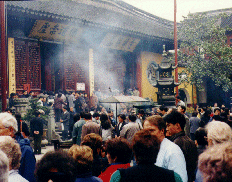 How crowded it is! Not only the cities, which are filled with people, morning, noon, evening, filling the sidewalks, their bicycles filling the bike lanes, traffic noisy and congested.
How crowded it is! Not only the cities, which are filled with people, morning, noon, evening, filling the sidewalks, their bicycles filling the bike lanes, traffic noisy and congested.And pollution! From the trucks, and busses and automobiles, from the soft coal that is burned for heat. As we rode through the countryside, I was impressed that every square foot was put to use. Each village is surrounded by small rectangular fields, sometimes with a shed or hut in the corner, however their homes are in the villages proper. These are storage sheds. Some hang over the rectangular fish ponds, these are for the night soil that feeds the algae that feeds the fish. And the next village is within sight of the first, and the next after that -- it seems to go on and on without end. All of this land is owned by the government. An individual can apply for a license to build a house on the land, and can sell that house, or leave it to his children, can dispose of it in any way he likes. But the land always belongs to the government. In the case of farm land, the government gives the land to the villages to administer, to apportion to the residents of the village. |
 There are no homeless in China. The government provides each with shelter, for better or worse. Sometimes a villager goes to the city for a paying job, and he may be seen sleeping on the street - he has a home in his village he can return to.
There are no homeless in China. The government provides each with shelter, for better or worse. Sometimes a villager goes to the city for a paying job, and he may be seen sleeping on the street - he has a home in his village he can return to.Rich Chinese can buy villas. These sell for $100,000 or more, and are large and new. The land still belongs to the government. Even the villas have very little land around them. Lawns and gardens as we know them, do not exist. The Chinese accept this government ownership of land without question, as they accept the one-child policy. These are a people who have always been controlled by their government, why should it ever be different? One of our guides told us about his marriage. Although he had known his wife for many years beforehand, the marriage was arranged through a "matchmaker" because it was always done that way! Tradition! The Chinese seem to be very pro-American. English is taught in the schools and the average Chinese is anxious to try out his or her English on travelers they encounter. In Shanghai there is a section of the People's Park, called "the English Quarter" where, on Sundays, you can go and converse with local Chinese. They practice their English and you can learn a little about their lives. |
 With the issue of managed health care so large in our country right now, I was interested in Chinese health care. It is pay-as-you-go! To be looked at in a hospital, you have to have 2000 yen (around $240). No money, no care, you die. Most government run factories have an in-house clinic where a worker can get immediate care. The factory management will also pay the $240 if a worker must go to the hospital.
With the issue of managed health care so large in our country right now, I was interested in Chinese health care. It is pay-as-you-go! To be looked at in a hospital, you have to have 2000 yen (around $240). No money, no care, you die. Most government run factories have an in-house clinic where a worker can get immediate care. The factory management will also pay the $240 if a worker must go to the hospital. There are other benefits working for a government factory beyond health care. The wages are low, but the rent in government provided housing is also very cheap. Working in the private sector brings high wages but none of these benefits. Many married couples have the best of both: one works for the government and the other in the private sector. And items marked as "hand painted" or "hand made" - really are! |